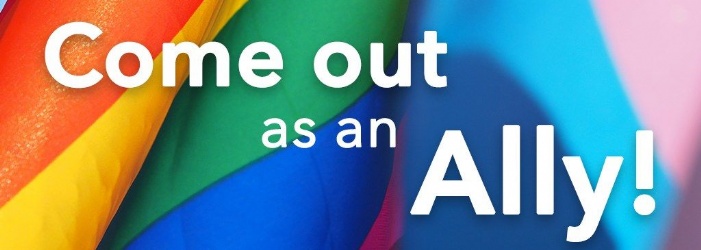Come out as an Ally!

This advice has been created using resources from Co-op Respect and Stonewall.
This advice has been created using resources from Co-op Respect and Stonewall.
What is an Ally?
To put it simply, being an Ally means you have made a statement that you believe in equality for LGBT+ people, that you are comfortable for LGBT+ colleagues to come out to you, and that you are interested to learn more about the challenges faced by the LGBT community.
What does being an Ally involve?
Whilst some Allies are more active than others, being an Ally can mean:
- Challenging homophobic, biphobic or transphobic behaviour. This type of negative workplace culture affects everyone in an organisation, especially when disguised as ‘banter’
- Becoming a member or friend of the Respect network
- Holding colleagues to account on what they are doing to advance LGBT equality at work, this is one of the most effective tools that straight Allies have
- Attending or supporting Pride events
- Asking questions when you’re not sure. Politely ask LGBT colleagues, the Respect network or friends for advice
- Keeping up to date with current LGBT issues
- Being yourself. For inspiration on how to be an effective Ally you need only reflect on your own personal values. Ask yourself, and your colleagues, how would you like to be treated at work?
How can I be an Ally in education?
- Be respectful and understanding. Students will come to you as they see you as an authority figure. If a student tells you something, it means they trust you.
- If you aren’t sure about what to say to students, then do your ‘homework’ before giving them advice. This means speaking to your pastoral team or Stonewall champion.
- Speak up when you hear homophobic, biphobic or transphobic language from students or colleagues. Tackling it the first time you hear it can mean that there may not be a next time.
- A student coming out to you is not a safeguarding issue, but it is pastoral. You should make sure the student feels safe and understood.
What difference would my support actually make?
Apart from helping raise awareness of LGBT issues and encouraging an open and inclusive workplace where colleagues can bring their whole self to work, being an Ally can also help
you to feel empowered.
Stats show that having a wide reaching Ally presence helps combat discrimination and improves wellbeing. You may feel you are only one voice, but together we can combat a whole range of issues, not just LGBT rights and ensure a positive culture for us all.
What if I don’t have time to be an Ally?
The term ‘Ally’ can encompass a whole spectrum of support, just because you are not shouting about LGBT rights from the rooftops doesn’t mean you are not an Ally.
Your activity doesn’t have to be time consuming but could include letting colleagues know when their language isn’t quite right, making sure all projects are fully inclusive, or for more ways to get involved with the Respect network.
Being kind, understanding and accepting is just as important as anything else.
What if people think I’m gay?
The initial response should be ‘so what?’, however if this is something you are genuinely worried about you can calmly explain that being an Ally means you are standing up for equality and want to make the workplace and the world, a better place for all.
I want to show my support as an Ally – what do I do now?
Put what you’ve read above into action!
Co-op Academies Colleagues can sign up and become a member of Respect. You can also read up on current LGBT issues, come to some events or for more information. Stonewall is a great resource.